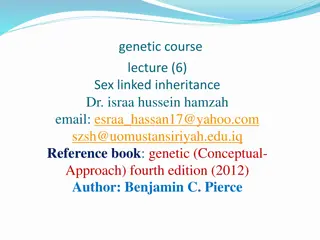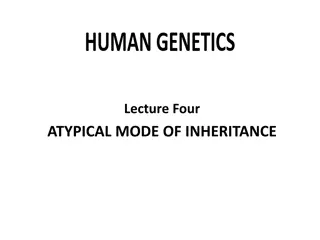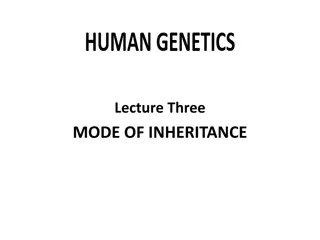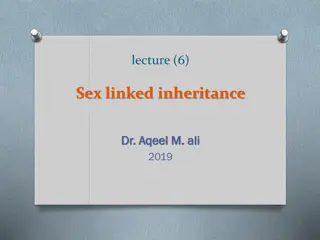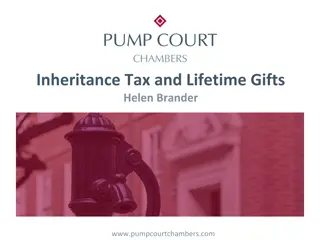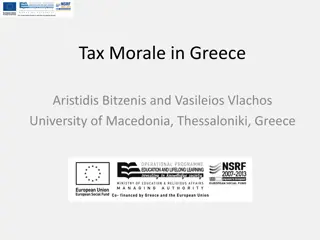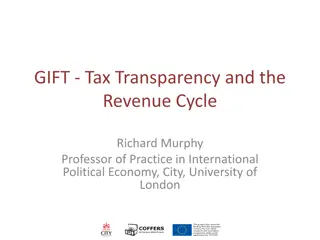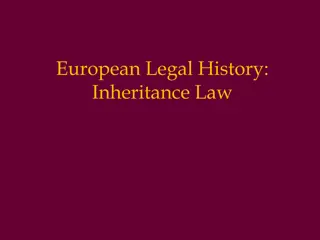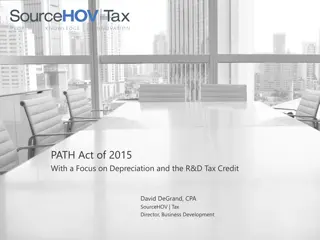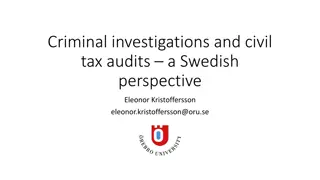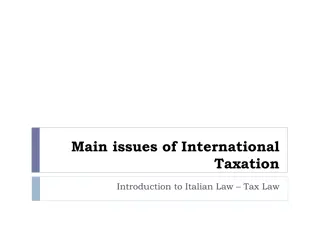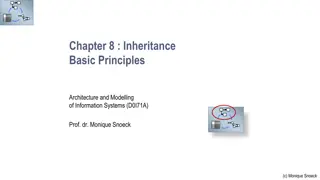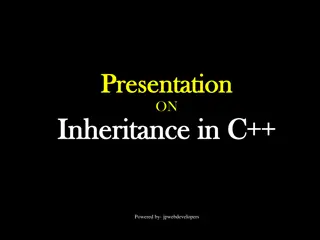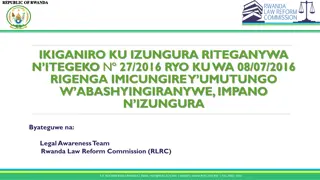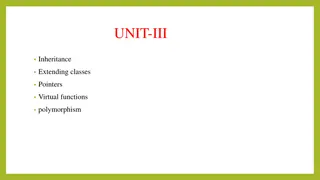Understanding International Inheritance Tax Rules
In the realm of international property and succession law, different legal systems like Common Law and Civil Law govern how inheritance tax applies to individuals with assets in multiple countries. For French residents, navigating French succession tax on worldwide assets is crucial, while non-French residents face specific criteria to determine tax liability. Double tax treaties play a key role in preventing dual taxation, especially concerning French real estate. This guide sheds light on the nuances of inheritance tax for individuals with cross-border assets.
Download Presentation

Please find below an Image/Link to download the presentation.
The content on the website is provided AS IS for your information and personal use only. It may not be sold, licensed, or shared on other websites without obtaining consent from the author. Download presentation by click this link. If you encounter any issues during the download, it is possible that the publisher has removed the file from their server.
E N D
Presentation Transcript
By Stefano Lucatello, Senior Partner of Kobalt Law LLP. Specialist International property and Succession Lawyers.
Common law Judges have an active role in developing rules and; Civil law (France Is based on a set of fixed codes and statutes, called the Napoleonic Code. The two legal systems are totally different.
If you are a French resident, when you pass away French succession/inheritance tax will apply to your worldwide assets. If you still have UK assets, it may be that you will also pay some inheritance tax in the UK, however there is a double tax treaty in place to ensure that you do not pay tax twice on the same assets. If you are a UK resident and own a property in France, when you pass away your estate will be taxed in the UK on your worldwide moveable assets. However, your property in France will have to be declared to the tax authorities in France and be subject to French succession tax.
DEFINITION OF A NON-FRENCH RESIDENT Your principal residence is located outside France. You spend less than 183 days per year in France Your main income is not in France You have been specifically deemed to be a non-French resident by a double tax treaty signed between the countries.
Under the terms of the tax treaties between France and most other countries ONLY French real estate is subject to French succession tax. Under the terms of the tax treaties between France and most other countries ONLY French real estate is subject to French succession tax. So if you own a second home in France and are not French resident, the property will be subject to French succession tax. So if you own a second home in France and are not French resident, the property will be subject to French succession tax. The double taxation treaty will avoid dual imposition of tax. The double taxation treaty will avoid dual imposition of tax. Cash and other moveable property located outside France will not be subject to French Succession tax. Cash and other moveable property located outside France will not be subject to French Succession tax. The tax treaty will remain in place after Brexit. The tax treaty will remain in place after Brexit. A person is considered tax resident in France if he/she has spent 6 out of the last 10 years in France, preceding death. A person is considered tax resident in France if he/she has spent 6 out of the last 10 years in France, preceding death. If considered resident in France , then the deceased s subject to French Succession tax If considered resident in France , then the deceased s worldwide assets subject to French Succession tax worldwide assets will be will be
Even if you relocate to France permanently from the UK to France, you may still be treated as being UK tax resident. Even if you relocate to France permanently from the UK to France, you may still be treated as being UK tax resident. The double taxation treaty will avoid double imposition of tax. If a person retains strong links with the UK, or if you have been in France less than 3 years prior to death, you may well still be deemed UK tax resident for worldwide assets. The double taxation treaty will avoid double imposition of tax. If a person retains strong links with the UK, or if you have been in France less than 3 years prior to death, you may well still be deemed UK tax resident for worldwide assets. If your actions clearly show that you have no link to the UK , then the UK tax authorities won t take any interest in you. Even if you relinquish your UK domicile you may still be liable for UK inheritance tax for assets in the UK, although if less than 350,000,no liability will arise. If your actions clearly show that you have no link to the UK , then the UK tax authorities won t take any interest in you. Even if you relinquish your UK domicile you may still be liable for UK inheritance tax for assets in the UK, although if less than 350,000,no liability will arise.
MAIN DIFFERENCE. French succession Law is more restrictive than English, in order to protect children. French succession tax , unlike UK Inheritance tax, is levied on the person inheritingrather than on the estate as a whole, and the rate varies dependent of the family link to the deceased. In the UK the estate pays the tax and the net proceeds are paid to the beneficiaries. In France, the proceeds are paid to the beneficiaries. You are only free to dispose of the Quotit disponible , as you wish. Your children are automatically eligible to inherit a certain portion of the assets. You can leave your assets to whomsoever you please.
Introduction Article 895 of the French Civil Code defines a will as an act, by which the testator disposes on his death of all or part of his possessions, which can be revoked. Two rules must be followed for making a valid French will A. The Will cannot be oral. It must be written B. Joint wills are not permissible. Art 969 of the French Civil Code sets out that a will can be handwritten or be a public instrument or created and then kept secret. Sound Mind The testator must be of sound mind, to make either a will of a lifetime transfer of assets: Art 910 Civil Code Revocation of a French Will Only revocable during the testator s lifetime. Express or implied revocation. Oral revocation is invalid A later will expressly revoking a former will. Intestacy In France Intestacy rules follow succession law. The law will divide your estate between heirs set out in a table. Registration of a French Will A French Will is registered in the central register, based on the Basle Convention, requiring all countries forming part of the Council of Europe, to have a uniform will registration system.
There are four types of will recognised in France: Holograph [ Olographe : Testator s own handwriting. There is no need to make it in front of a Notaire or witnesses. Most common type. It must be dated and written preferably in ink not pencil. If written in another language it must be translated into French Authentic [ authentique : Prepared by a Notaire, as a public deed, in accordance with the testator s wishes and in the presence of the notaire & two independent witnesses or 2 notaires. Must be dated and have the place of signing and shouldn t be written by the testator. Secret [ Mystique ]: Handed to the Notaire, and he prepares an acte de souscription with the date of receipt. Signed in the presence of a notaire and two witnesses in a sealed envelope. International [ international ]: Introduced in 1994. Prepared in any language and does not have to be hand-written, is executed in front of two witnesses and a Notaire. Useful for foreigners living in France.
ENGLISH WILLS AND CODICILS CAN BE; WRITTEN BY HAND WRITTEN BY A LAWYER OR WILL WRITER AND MUST BE; DRAFTED IN ACCORDANCE WITH THE WILLS ACT OF 1834 EXECUTED BY THE TESTATOR IN THE PRESENCE OF AT LEAST ONE WITNESS, PRESENT AT THE SAME TIME, AS THE TESTATOR EXECUTES THE WILL IF A BENEFICIARY IS ALSO AN EXECUTOR, THERE SHOULD BE TWO OTHER WITNESSES PRESENT AT THE SAME TIME, TO AVOID DOUBT.
Dying without a Will CREATES AN Under French Law if there are children of the marriage, the spouse can choose to receive either one quarter of the estate absolutely or the whole estate as an usufruct . [ Right to use for life] Intestacy Situation French succession Law Can lead to several situations If there are no children but there are parents, the inheritance is shared half to the spouse half to the parents Even, detrimental to the spouse NB Under English law, a spouse or civil partner keeps all assets including a property, up to 250k and all personal possessions , whatever their value. The remainder will be shared as follows: spouse or civil partner absolute interest in 50% of the remainder. The other 50% divided equally between living children
Advantages and disadvantages between wills and Lifetime gifts: Disadvantages Advantages A will does not grant the beneficiary immediate access to assets in the same manner as a gift. A lifetime gift is generally irrevocable, whilst it is possible to change a will. With a gift it is only possible to transfer assets in your current ownership, whilst it is possible to transfer all your future assets in a will. A will does not benefit from tax allowances[ as opposed to lifetime reliefs] as does a lifetime gift.
Once a French will is made, succession tax will be paid on the death of the testator as follows: Up to 100,000 euros can be inherited tax-free and then tax is payable on amounts at: (Up to 8,072 5% /8,073 12,109 10% / 12,110 15,932 15% / 15,933 552,324 20% / 552,325 902,939 30% / 902,839 1,905,677 40% / then ... 45%) Direct Heirs Up to 15,932 euros tax free, then rates are: ( Up to 24,430 .35% / Then... 45% ) Brothers & Sisters Up to 7,967 euros tax free for nephews and nieces; Up to 1,594 euros for more distant relatives tax free. Amounts above this ARE TAXED AT 60%. Other relatives and unrelated people
Allowance of 159,325 euros for heirs with a physical or mental disability. Cost of making a will and opening & conducting the succession procedure. Deductions and allowances. Provable debts of the deceased Medical expenses, Funeral costs, up to 1500 euros. Gifts or legacies made to charities recognised in France, are exempt. Deductions and allowances. Deductions & allowances. In the case of gifts or legacies to children, the tax free amount is 100,000 euros If the children have lived continuously in the same home with the deceased and they are single or widowed or divorced at the time of the death, they are exempt from tax .
You can make a Simple will in writing, without any formality, [Holographe] but it is preferable that it is drafted by a Notaire Through a Notaire (Authentic will) the risk that it can be lost or contested is removed. The cost of preparing the will through a notaire is around 200 A will made in this way is placed in a central register Can be recovered at a later date by any Notaire who may be instructed to deal with the inheritance Fichier National des Dispositions de Derni res Volont s A will made in front of a notaire may later be contested by potential inheritors as being untrue or invalid. . It is better to fill out one together and it is quite often to appoint a proxy to do this on their behalf. The beneficiaries have to fill out a declaration
The procedure after the death The Notaire has to The has Notaire will to be will prepare be signed prepare this by the this declaration the beneficiaries declaration. . it it beneficiaries. . Commenced by the relatives to deal with the formalities of registering the death. Commenced by the relatives to deal with the formalities of registering the death. signed by Inventory and valuation A professional valuer may be necessary By the notaire Notaire prepares an acte de notaire Where it sets out how the estate is to be distributed The succession procedure is carried out by the notaire.
If you are married and live in France permanently your assets and liabilities are subject to a set of rules called a matrimonial regime , or regime matrimonial and it does not matter whether you are married in France or not. The Regime is divided into three types: Separation de biens . Communaut universelle The default arrangement is communaut reduite aux acquets . 1. 2. 3. If you want to change your existing matrimonial regime you must visit a Notaire. There are two further matters to bear in mind as well: Use of The Tontine is another arrangement whereby a couple can own a house jointly with ownership going directly to the survivor on the death of one of them.[ Closest equivalent to our Joint Ownership] Use of the French (SCI ). This is a way of holding property through a specially formed company of a type known as a societ civile immobili re: which may be especially relevant if the home is a holiday home and you are not a French resident. This is a useful succession tax avoidance tool.
Four rules to note: The gift/inheritance is taxable if the donor/deceased is resident in France at the date of the gift/death. A gift/inheritance is also taxable if the recipient is resident in France and has been so resident for at least six of the last 10 tax years prior to the year in which the gift-inheritance is received. A gift/inheritance from one non-resident to another non-resident is taxable if thegift/inheritance is a French asset. Non-residents are liable to succession tax on any property or any rights over property situated in France. [Note double taxation treaties which avoid double taxation]
Only that part of the estate belonging to the deceased is subject to French succession laws. The Napoleonic code, specifically protects the interests of children of the family, so that they cannot be disenfranchised. The French Civil code system is called Forced Heirship . That part earmarked for your children is called La The part which is freely disposable is called La Under French civil law that part earmarked for the child or children cannot be given to a third party. A surviving spouse is NOT automatically entitled to anything you leave, UNLESS you take specific action to disinherit them, in which case they will receive one quarter of the French Estate. This is because the estate belongs to the family and not one specific person. The If you leave a SPOUSE ONLY; 25% TO THE SPOUSE & 75% IS FREELY DISPOSABLE. If you leave a SPOUSE & 1 CHILD: 50% TO SPOUSE & 50% IS FREELY DISPOSABLE. If you leave a SPOUSE & 2 CHILDREN : 33.33% TO SPOUSE & 66.66% FREELY DISPOSABLE. If you leave a SPOUSE & 3 CHILDREN : 25% TO SPOUSE & 75% IS FREELY DISPOSABLE. EXAMPLE: IF YOU DIE LEAVING A SURVIVING SPOUSE & 2 CHILDREN, THE CHILDREN WILL GET 1/4 OF THE ESTATE & THE CHILDREN 2/3 OF THE ESTATE & THE REMAINING 1/12 IS FREELY DISPOSABLE. EXAMPLE: IF YOU DIE LEAVING NO SPOUSE AND 2 CHILDREN THEN 2/3 TO THE CHILDREN & 1/3 FREELY DISPOSABLE. THE ABOVE EXAMPLES APPLY IN THE ABSENCE OF A WILL BEING WRITTEN, OR BUYING EN TONTINE , A FRENCH MARRIAGE CONTRACT BEING ENTERED INTO OR A GIFT etc. Only that part of the estate belonging to the deceased is subject to French succession laws. The Napoleonic code, specifically protects the interests of children of the family, so that they cannot be disenfranchised. The French Civil code system is called Forced Heirship . That part earmarked for your children is called La R serve The part which is freely disposable is called La Quotit Under French civil law that part earmarked for the child or children cannot be given to a third party. A surviving spouse is NOT automatically entitled to anything you leave, UNLESS you take specific action to disinherit them, in which case they will receive one quarter of the French Estate. This is because the estate belongs to the family and not one specific person. The Quotit If you leave a SPOUSE ONLY; 25% TO THE SPOUSE & 75% IS FREELY DISPOSABLE. If you leave a SPOUSE & 1 CHILD: 50% TO SPOUSE & 50% IS FREELY DISPOSABLE. If you leave a SPOUSE & 2 CHILDREN : 33.33% TO SPOUSE & 66.66% FREELY DISPOSABLE. If you leave a SPOUSE & 3 CHILDREN : 25% TO SPOUSE & 75% IS FREELY DISPOSABLE. EXAMPLE: IF YOU DIE LEAVING A SURVIVING SPOUSE & 2 CHILDREN, THE CHILDREN WILL GET 1/4 OF THE ESTATE & THE CHILDREN 2/3 OF THE ESTATE & THE REMAINING 1/12 IS FREELY DISPOSABLE. EXAMPLE: IF YOU DIE LEAVING NO SPOUSE AND 2 CHILDREN THEN 2/3 TO THE CHILDREN & 1/3 FREELY DISPOSABLE. THE ABOVE EXAMPLES APPLY IN THE ABSENCE OF A WILL BEING WRITTEN, OR BUYING EN TONTINE , A FRENCH MARRIAGE CONTRACT BEING ENTERED INTO OR A GIFT etc. R serve Quotit disponible disponible . . Quotit disponible disponible and the and the R serve R serve will depend upon how many children you leave behind. will depend upon how many children you leave behind.
Parents and other relatives are NOT protected and can be disinherited SUBJECT TO ordinary rights of Inheritance. If you do not have children and you do not disinherit other relatives then Ordinary rights apply: Father or mother ; 25% of estate Father and mother: 50% of estate Brother & sister : 50% of estate. Gifts during lifetime; will etc and if no surviving children, up to the value of that person s entitlement In the case of heirlooms claim 50% of the value and the other 50% goes to the surviving spouse. The surviving spouse & the children having 3/4 [ nue-propri t ] OR Life use of the whole estate known as usufruct & the children having the Nue propri t . When the spouse des in this case, then the two parts automatically come back together without any further tax being payable. If there are children from outside the relationship : choice of asking for an usufruct ] and the children 3/4 Gifts during lifetime; Gifts given to children during their lifetime can be reclaimed, if no In the case of heirlooms: and in the case of no will etc, the brothers and sisters can The surviving spouse: Is entitled to a minimum of 25% of the estate [ Pleine propri t ] OR If there are children from outside the relationship : then she gets absolutely [ no
The right to life occupation is called Droit The Droit Viager cannot exist if the deceased specifically excluded it by will or if and SCI exists. So if you want to use an SCI to won property, then you must ensure correct drafting of the Company articles. The Droit Viager must be take up and notified to the Notaire dealing with the succession within 12 months of death. During the 12 months after death the surviving spouse can live in the home cost free, as long as the property was owned by the deceased or both of them. Children of the couple born outside marriage : inside as do children of the deceased born to another partner. Adopted children : from any ordinary rights of inheritance from their natural parents. Couples with no children: parents of the deceased. However they are not entitled to any entrenched rights of inheritance. Therefore with a will or such like, you can exclude them and give all the estate to the surviving spouse. Droit Viager Viager . .This continues even after remarriage. Children of the couple born outside marriage :benefit to the same rights as those born Adopted children : benefit from the same right as as natural children, but are excluded Couples with no children: The surviving spouse takes it 100% subject to there being any
A will asking to adopt inheritance rules of your country of nationality or habitual residence to deal with your estate. Does not affect inheritance tax, this is still payable in the country in which the property is. Just relates to your ability to leave the estate to whom you wish How does it work? British people can make a will including a clause stating that they want UK inheritance law to apply. It must be in French language and format or English. Note that a French lawyer and notaire will be more familiar applying French law rather than others countries law Who can use it? NON French people living in France, among of them, British. This regulation also applies to non-EU nationalities as well.
ENGLISH WILL? FRENCH WILL? BOTH?!! ENGLISH INHERITANCE RULES AND LAW DIFFERS FROM THE CIVIL LAW RULES OF FRANCE AS WE HAVE SEEN FRENCH LAW VERY RESTRICTIVE AND DEMANDS THAT PART OF THE ESTATE BE LEFT TO A CHILD OR CHILDREN OF THE FAMILY. BRUSSELS IV SHOULD THEREFORE SIMPLIFY MATTERS .. IT IS THE LAW OF A PERSON S HABITUAL RESIDENCE [FOR ALL COUNTRIES EXCEPT THE UK] OR IN THE CASE OF A UK NATIONAL, HIS DOMICILE , WHATEVER THAT IS HAVING MADE AN EXPRESS CHOICE [ MANY TIMES ITS HIS NATIONALITY] THERE WILL BE NO CHANGE AFTER BREXIT. THIS IS BECAUSE THE UK HAS NEVER RATIFIED THE REGULATION. NOTWITHSTANDING THAT, A UK CITIZEN CAN USE ANOTHER COUNTRY S LAW TO REGULATE HIS FOREIGN ASSETS, [ NOT HIS HOME IN THE UK] AS A US OR AUSTRALIAN CITIZEN CAN. WE NEED TO IDENTIFY WHETHER YOU COME FROM ENGLAND AND WALES, SCOTLAND OR NORTHERN IRELAND AS THE LATTER TWO HAVE DIFFERENT INHERITANCE RULES HOWEVER AS REGARDS INHERITANCE TAX, THE SAME RULES APPLY IRRESPECTIVE WHICH PART OF THE UK YOU COME FROM. THE REGULATION DOES NOT DEAL WITH THE VALIDITY OF A WILL JUST THE IMPLEMENTATION OF THE CHHOSEDN LAW TO BE APPLIED IT DOES NOT AFFECT THE TAX PAYABLE UIN FRANCE ON AN ASSET LEFT BY THE DECEASED. YOU CAN AS BEFORE BRUSSELS IV CASME INTO EFFECT JUST HAVE AN ENGLISH WILL , GET THE PROBATE FOR IT AND HAVE IT RESEALED IN FRANCE THE ONLY PROBLEM AS I VE SAID IS THAT NOTAIRES EITHER DON T UNDERSTAND OR WANT TO UNDERSTAND PHRASES IN ENGLISH WILLS, SUCH AS IN TRUST FOR WHICHEVER YOU CHOOSE.. DON T BE FOUND SHORT BY NOT HAVING A WILL AT ALL!!
Brexit will not affect French inheritance procedures, laws or taxes. Inheritance matters are governed by rules of private international law. EU REGULATION 650 / 2012 applies. The UK did not adopt this Regulation. So a UK citizen, tax resident in the UK, can t leave a property in the UK, according to a foreign law. He can HOWEVER leave a foreign property in accordance with English law. France did adopt it fully, so a Brexit will not affect its application to French property
If you want to have some control over your estate after death, then: If you want to have some control over your estate after death, then: A. Modify the statutory rights of protected heirs and others. B. Ensure the spouse gets it all with a marriage contract. C. Increase the share they get through a will or a lifetime gift. D. Buy the French property En Tontine , so it automatically goes to the surviving E. Enter into a family Inheritance pact with protected beneficiaries to postpone or A. Modify the statutory rights of protected heirs and others. B. Ensure the spouse gets it all with a marriage contract. C. Increase the share they get through a will or a lifetime gift. D. Buy the French property En Tontine , so it automatically goes to the surviving spouse on death. E. Enter into a family Inheritance pact with protected beneficiaries to postpone or defer all inheritance rights in favour of the surviving spouse. spouse on death. defer all inheritance rights in favour of the surviving spouse. F. The surviving spouse may choose not to exercise its rights to help children from F. The surviving spouse may choose not to exercise its rights to help children from outside the marriage, reduce their exposure to higher tax rates, when they benefit from the surviving spouse. outside the marriage, reduce their exposure to higher tax rates, when they benefit from the surviving spouse. G. Consider using an SCI , through which to buy and hold the home. G. Consider using an SCI , through which to buy and hold the home. H. Use a will to hold property in en H. Use a will to hold property in en indivision preferential rights to the property, known as lodgement , although other beneficiaries will need to be compensated. indivision , to help the surviving partner to get l attribution pr f rentielle , to help the surviving partner to get pr f rentielle du preferential rights to the property, known as l attribution lodgement , although other beneficiaries will need to be compensated. du
Can a child be excluded? Yes, under English Law, but not under French Law. Can we make a will as a couple? In the UK yes. Called a Mutual will Not in France English wills of French resident. Take care as English wills are drafted in a different unacceptable format to French law wills Does English law give total freedom? Yes as long as you are of full mental capacity Is it vital to handwrite a French will? No Where do I find a notaire who can speak English? On the internet. Gifting a property rather than inheriting? Yes, Lifetime dispositions give rise to different tax considerations. Marriage or pacs to avoid tax? In France Yes, if you are two heterosexual persons living together or a Gay or lesbian couple, Do It! You can now enter into a Civil pact in the UK even though you are not heterosexual. How do I get probate for UK assets if French resident? File a UK Cap 400 How can we mitigate a large tax bill? Do good lifetime Tax and estate planning!
Tel DDI +44 (0) 207 749 3209 Tel Mob + 44 (0) 7802 921339 E-mail: stefanol@kobaltlaw.co.uk Web: www.kobaltlaw.co.uk Skype: stefano.kobalt Kobalt Law LLP Registered Office: Office 5 Fairbank Studios 75/81 Burnaby Street Chelsea London SW10 0NS



